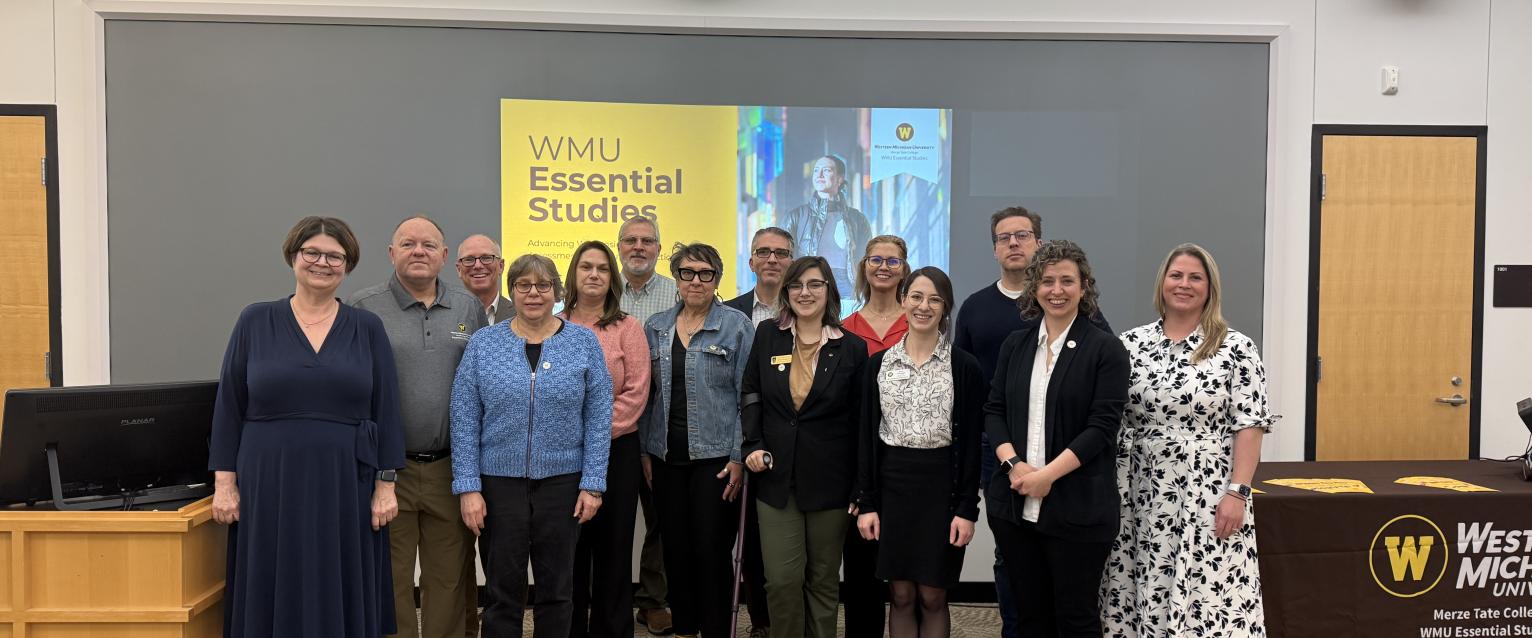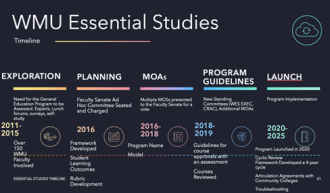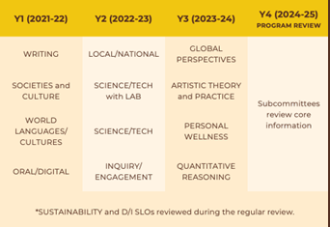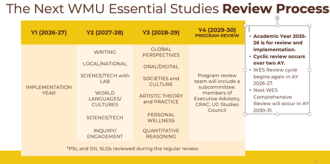2024-25 WES Comprehensive Review
During the 2024-25 academic year, Western Michigan University concluded an ongoing five-year cycle of review of the WMU Essential Studies program.
WMU Essential Studies was built with assessment at the core. Ongoing processes continually collect and assess initial and developing data. From 2011 until the launch in 2020, Faculty Senate committees build assessment structures and guidelines that would ensure continual improvement.
Each year, beginning in academic year 2020-21, the following data was collected.
- Student Learning Outcome (SLO) performance. Instructors completed SLO rubrics (not connected to grades) as appropriate for students in each WES course.
- Course Offerings. Ongoing review to ensure that listed courses were offered at least one per 12 months to ensure availability to students.
- Course Cyclic Reviews. During a three-year cycle, every course went through a short ‘check-up’ review. Departments answered key questions regarding the course, their perceptions of the course, and any innovations or revisions they had made. Primary materials – syllabi and current WES assessment plans were included and reviewed.
In 2024-25, the WMU Essential Studies Executive Advisory Committee formed and managed four major sub-committees.
WES Course Review Committee
- Chairs: Linda Borish, Cynthia Klekar-Cunningham
- Charge: Review all WES courses to determine placement and status.
WES SLO Performance Review Committee
- Chairs: Daria Orlowska, Eli Rubin
- Charge: Conduct a deep dive into all of WES SLO performance data to seek relevant trends and issues.
WES System and Structure Review
- Chairs: Megan Hess, Veronica Rice McCray
- Charge: Broadly review the entire WES program and processes.
WES Student Perspectives (WSA-led)
- Chair: Liberty Kostrzwa (with assistance from Randy Ott)
- Conducted a survey and focus groups with WMU students to better understand student perceptions and knowledge of WES
Key Insights (details available in attached slides and presentation)
- Most listed WES courses are working as planned, with only a few recommended for removal due to systemic issues and limited offerings.
- Students are mostly progressing well through scaffolded SLOs and taking courses and SLOs in the recommended order. Insights from deep dives into SLO performance by areas, levels, and via various student populations provide feedback on student learning and progress through SLOs.
- Students generally value and understand the purpose and processes of WES, but often still select courses based on convenience or other non-academic criteria.
- Issues found with several key processes, leading to additional initiatives (below)
The Review resulted in several key recommendations and initiatives:
- Review of Student Learning Outcome Rubrics. Committee recommends a full review of all SLO Rubrics to simplify, align, and systematize faculty and student understanding of SLO performance.
- Revised WES Course Assessment Plans and Procedures. Committee recommends a newer, easier-to-use WES Assessment Plan form that aligns better with WES intent and offers additional flexibility to faculty to revise courses to meet student needs more easily.
- Comprehensive Faculty Communication. Committee recommends development of a comprehensive and ongoing campaign of faculty communication on WES guidelines, responsibilities, and procedures, and a well-developed and well-maintained easy-to-access source of information.
- Improved Transfer Credit Protocols. Committee notes the challenges inherent in WES credit evaluation due to cross-disciplinary nature of SLOs and areas and levels and recommends a structured protocol for course evaluation for WES credit and an ongoing and growing database of reviewed courses.
Opportunities
- All the committees note that WES provides a powerful recruitment tool for WMU and a core educational experience that is not present in most competing institutions and recommends that additional resources are developed to advertise WES to prospective students and their families.
Next Steps
The 2024-25 academic year will focus on review, analysis, and implementation of recommendations. The next cyclic review will begin in the 2025-26 academic year. To keep the review cycle in line with Higher Learning Commission (HLC) cycles, the upcoming cyclic reviews will occur in a compressed two-year cycle.





